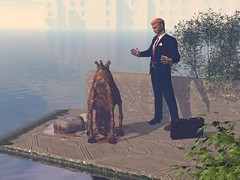March 31, 2008
Technotolerance test
 Test Your Techno Tolerance at Sage Crossroads (found via IEET) is a small quiz to see whether you are a transhumanist or luddite. One of the nice ideas is to separate questions for the embrace of "hard" technology and biotech, enabling a bit more finegrained distinction between Shapers and Mechanists. It reminds me a lot of the "worlds smallest political quiz".
Test Your Techno Tolerance at Sage Crossroads (found via IEET) is a small quiz to see whether you are a transhumanist or luddite. One of the nice ideas is to separate questions for the embrace of "hard" technology and biotech, enabling a bit more finegrained distinction between Shapers and Mechanists. It reminds me a lot of the "worlds smallest political quiz".
In reality, most people (69.3%) seem to be transhumanists (yay for bio and tech!) - likely due to a very skewed sample on the net so far and perhaps asymmetry between yes and no answers. This is followed by 19% technoprogressives (pro biotech). 9.5% bioconservative (no to biotech) and 1.7% bio-luddite (no to everything). This result seems to suggest that views on biotech and hard tech are tightly connected - few people think that biotech is good but hard tech is bad, or vice versa. Not terribly surprising, but a good thing to check.
March 29, 2008
Trust me, I'm a physicist!
 On practical ethics I blog about Extinction Risks and Particle Physics: When Are They Worth it? due to the recent US lawsuit trying to stop the LHC.
On practical ethics I blog about Extinction Risks and Particle Physics: When Are They Worth it? due to the recent US lawsuit trying to stop the LHC.
If there is a tiny risk that turning on the LHC will destroy the world (due to black holes, black saturns, monopoles, strangelets, vacuum decay or divine intervention), isn't that a good argument for not turning it on? It turns out that if it makes our lives just a tiny bit better it may still be worth it. Just the side-effect of having led to the discovery of the WWW might have justified a lot of potential risk from CERN.
A less utilitarian and more precautionary approach would be to say we should not do any experiments until we have understood the risks better. This suffers from the problem that we likely cannot understand the risks better without making experiments, beyond occasional theoretical insights like the Bostrom and Tegmark paper. Even if we think we have better theoretical understanding after a while, a nervous sceptic would be able to point out that our updated probabilities are not necessarily more trustworthy than before since they have not been empirically tested. If we ought to wait at time A, then we ought to wait at time B too. In addition, we have opportunity costs of not doing the experiment (physicists leaving for finance, no spin-offs, particle physics pranks).
In the end, it is a gamble, but a gamble I think we can be fairly confident about. I'm much more worried about the totally unexpected risks. Nobody seems to have worried about creating Einstein-Bose condensates, despite them possibly only occurring due to human physicists in the entirety of the history of the universe!
March 27, 2008
Interstellar trade, brains in vats, superspace, life extension and the varieties of silliness
 I just read Paul Krugman's very entertaining The Theory of Interstellar Trade. That led a colleague to show me the paper Stuperspace, and I had to respond by showing her the Brain in a Vat essay. Laughter all around!
I just read Paul Krugman's very entertaining The Theory of Interstellar Trade. That led a colleague to show me the paper Stuperspace, and I had to respond by showing her the Brain in a Vat essay. Laughter all around!
Krugman writes: "It should be noted that while the subject of this paper is silly, the analysis actually does make sense. This paper, than, is a serious analysis of a ridiculous subject, which is of course the opposite of what is usual in economics". While funny, there is something problematic with this outlook. Why is it silly to consider interstellar economics?
That we haven't got interstellar business and that it will not arrive for a long time doesn't preclude serious study. Looking through the economic literature I am pretty certain we can find an enormous number of papers about situations that have not happened or will never happen (and that leaves out all the unrealistic Gedankenexperiments).
What does make interstellar trade silly, while the economics of world government seems to be non-silly? Both papers use real economic theory, empirical data and known physics to make statements, but the later seems far less likely to be regarded as silly. It can't just be that it is in a peer reviewed journal and nicely typeset. Maybe we can imagine world government more easily than interstellar travel, but that seems unlikely to make much of a difference - most people can just imagine interstellar trade as very long sea journeys, while globalisation is far harder to visualize. Similarly, it is easy to guess that the engineering issues involved in interstellar trade can be enormous, but most people have little knowledge of the actual details. Is a low prior probability enough to move it into the silly category while world government (with presumably big political difficulties) is assumed to have a much higher probability? Again, this seems unlikely. Most people would lump them into the category "really unlikely but possible".
Graziella Caselli, Jacques Vallin, Demographic Trends: Beyond the Limits?, Population: An English Selection, Vol. 13, No. 1, Biodemographic Perspectives on Human Longevity (2001), pp. 41-71 is a silly paper about a serious matter - or a serious paper about something silly. They look at the demographic effects of various scenarios of life extension and gender bias, finding various results. Again, the methods are conservative and the assumptions are not that extreme (no immortals etc). Yet the authors are constantly making fun of the whole issue. In the discussion they reject their own conclusions by regarding them as equally far-fetched as Martian invaders kidnaping Earth women! Why is a 150 year life expectancy silly? As the paper mentions, current trends show no sign of slowing and we have historically seen doublings of life expectancy - even when leaving out radical technological possibilities 150 year life expectancies are within the range of the thinkable.
One reason they make fun of their own work is that they realise the arbitrariness of their assumptions (Krugman does this too). Caselli and Vallin have to make some assumptions to feed their model and they know these can be varied endlessly: even a valid prediction will be undermined if we are very uncertain about the value of its parameters. But this does not mean the predictions are useless: the population oscillations caused by delayed fertility or the asymmetry between male and female gender selections are obviously relevant.
Meanwhile the brain in a vat paper makes fun of discussions philosophers tend to take somewhat seriously by lumping them all together into absurdity. The trolley problem has produced a large body of writing, and it is by no means trivial - especially the fat man version has produced an intense side-discussion about neuroethics (see Greene, Singer and Kahane). The example may be silly, but most people recognize that it is serious in meaning. But when combining other serious thought experiments they suddenly become silly - the brain in a vat is non-silly (despite being completely science fictional), the trolley is non-silly, but a brain in a vat in a trolley is silly. Partially it may be because the suspension of disbelief engendered by stating that it is a thought experiment intended to explore something important (the nature of reality, utilitarian morality) is broken when it is conflated. But presumably there might be serious matters that deal with both perception of reality and utilitarianism? That they are rare in normal life is not an issue, we do not suffer ethical dilemmas most of the time either.
Stuperspace is just plain silly, parodying the style and hyperbole of string theory. There doesn't seem to be any serious conclusion, not even that string theorists are pompous, just enjoyable wordplay and parody of academic style.
Maybe one could apply a nonsense approach to distinguishing these kinds of silliness. Nonsense is an utterance within a language that does not have any identifiable meaning. There may be levels of nonsense, since some meaning may be hidden or the absurdity lies on different levels. Stuperspace is just barely grammatical (and the math is mostly random). The trolley story makes sense as a fictional setting, but is an exceedingly unlikely situation - the link to reality is extremely tenuous, making the meaning (if any) equally tenuous. But both the interstellar trade paper and the population paper take place in hypothetical worlds which are much more closely linked to plausible future worlds. They have meaning, they could guide actions in a rational way (should I invest in a space business venture? Is a particular population policy likely to produce good results?), but they are largely hypothetical. This does not make them nonsense, just as the extrapolations of the world government paper does not make it nonsensical.
Another approach to silliness is to argue that certain papers are foolish in the sense that they waste time and effort that could be used for something more useful. But this evaluation is both author/reader dependent (distracting from some pointless work would make the paper non-silly) and depends on a risk/benefit estimate. The impact of life extension is likely to be big and is often used as an argument about whether funding such research is a good thing. Hence a paper looking at it is at least useful for guiding those funding decisions. Some risks are exceedingly unlikely but if they would happen they would be disastrous (e.g. existential risks); hence it may be rational to not just explore them and come up with protections, but also to explore whether they have any appreciable probability in the first place. But clearly we need to use our priors to draw the line somewhere, since there are an infinite number of improbable and unthinkable risks we could consider (planet-eating space goats!)
But again, regarding some things as silly does not seem to result from an estimation that the probability is extremely low, it seems to be a direct rejection of it as unthinkable and irrelevant - not the same thing, although the rejector will quickly argue that the chances of the things happening are minuscule. The rejection has many similarities to the yuck reaction we see in ethics, where certain possibilities are rapidly rejected as immoral with little reflection (c.f. the work of Haidt). So maybe the best explanation of what makes a paper silly is just that it goes against the social intuitions we have built up about thinkable, serious subjects. Space travel is science fiction and science fiction has low status, so hence papers about the economics of space travel must be silly. Life extension is silly, so papers looking at its consequences must be silly. Framing world government in terms of non-silly globalisation makes it non-silly.
If this is right, we should expect that many silly things are actually worth taking seriously on their own terms. As long as they are not nonsense.
[ Overcoming bias has a post on the subject with some relevant comments. ]
We *Are* Living in an Absolute World
A few days ago I blogged about some Absolute vodka marketing, and I noticed this ad:
It now seems that it is coming true. Advocate has an online story, Labor of Love, about a male pregnancy. The husband happens to be a female-to-male transsexual, making it possible (if tricky, especially since the medical community, let alone people in general, seems unsettled by it). Personally I think this is a good step towards real equality and wish them the best of luck.
(Insert obligatory Stan/Loretta reference - he is getting closer to having the actual right to bear a child)
March 26, 2008
I'm the Love Doctor!
 One of my papers is now out in Neuroethics 1:1: Neuroenhancement of Love and Marriage: The Chemicals Between Us by me and Julian Savulescu (access apparently free for 2008 - the first hit is always free!).
One of my papers is now out in Neuroethics 1:1: Neuroenhancement of Love and Marriage: The Chemicals Between Us by me and Julian Savulescu (access apparently free for 2008 - the first hit is always free!).
Our paper is about the neuropharmacological enhancement of love and why it is likely a good idea, why it is not immoral and some ideas of how it could be done in the near future if the pharmacology goes the way we expect. Basically, we evolved the love-systems in our brains in a very different environment from the present, where people died young and there was not much point in having multidecade bonding. Add to this the usual evo psych reasons men and women may want to get different things, and we get a plausible explanation for some of the high divorce rate - and subsequent psychological suffering. To reduce this we could modulate the bonding system using oxytocin-like compounds, make the partners more similar in desire by modulating testosterone or even try to recreate imprinting. This is not inauthentic when applied to an already existing, authentic but faltering relation (it might be problematic in the classic "love potion" scenario when a drug engenders an emotion that is not based on the partner's normal mental life). There are of course a lot of other ways to strengthen pair relations, the neurochemical one is just yet another interesting option that is becoming possible.
I really want to write a more extended and deep version of this paper, this one was a bit rushed. I have so much material to play with and the subject is fun - although I'm definitely not qualified by any practical experience to write about lasting relationships... but I'm an unashamed theoretician anyway!
March 25, 2008
Yay for Cybrids and Prepersons from the Future!
 The Torygraph writes that the Embryology bill is a beacon of hope because it will allow useful research on stem cells, despite involving animal human hybrids. The usual suspects are against it for the usual reasons, i.e. the yuck factor involved in breaching species boundaries (despite these boundaries being porous and broken every day for the last decade or so in many biolabs), manipulating human tissue that could conceivably become a person, anti abortion views and occasionally general anti-science views.
The Torygraph writes that the Embryology bill is a beacon of hope because it will allow useful research on stem cells, despite involving animal human hybrids. The usual suspects are against it for the usual reasons, i.e. the yuck factor involved in breaching species boundaries (despite these boundaries being porous and broken every day for the last decade or so in many biolabs), manipulating human tissue that could conceivably become a person, anti abortion views and occasionally general anti-science views.
The Telegraph article actually suggests that the last aspect is the main reason the Catholic Bishop's oppose it: scientific understanding of human development can profoundly undermine the traditional view of human nature, human dignity and the human species.
The problem is of course that if the true state of affairs is just atoms and void, then any concept built on an incorrect description of the world will be invalid and likely misleading. An account of human dignity based on the existence of vital spirits that do not actually exist is not ethically relevant, it is just a fairy tale. It might be that an empirical description of the world does not contain all relevant knowledge, but at the very least understanding the physical world is a part of the knowledge.
(This view is problematic: how do we ever get this relevant knowledge? A dualist answer, that it somehow gets put into the physical world by external forces, is vulnerable to empirical observation of this emergence, suddenly turning the non-physical part of the world into something partially empirically observable. A rationalist answer, that we can deduce it logically, is equally problematic for the anti-research view since it suggests that we need to think as well as check the deductions against the real world - i.e. more research).
Perhaps the biggest problem with the bill is that the debate has become "yuck! it is immoral!" vs. "It is not immoral! It is useful!" - stem cells are likely to become useful, but we have no guarantees. It would be better to focus on the issue of what we want to use as definition of human and personhood. Having human mitochondrial DNA, human genes or human nerve cells does not make a mouse human; having a human-like mind does. Human dignity is usually used as a substitute for other ethical concepts, usually respect and autonomy. While we can in principle respect anything, the kind of deep respect we usually think of when talking about human dignity is respect for persons - entities that at the very least have identity. Blastocysts make bad carriers of personhood since they split, merge and die so randomly. Autonomy is not possible until you have a brain and mind that can be autonomous.
We might respect a preperson (e.g. a fertilised egg) in the sense that we think it will become a person with autonomy sometime in the future, and hence we expect the future person to have interests in the well-being or modification of the preperson. While the current preperson does not have any rights or interests, we might still have some obligations not to act (or to act) in certain ways towards it, just as we might have obligations to the dead. They are not as strong as the rights of the living, but we tend to at the very least regard it as socially good to respect them. But if an object will not become a person (say a fertilised egg that will never be implanted), then there will be no interests from the future at stake. At most we might want to avoid confusion due to the object being indistinguishable from a prepersion (egg A will be implanted, egg B will not - they could be physically identical yet have different future interests), but this could be done by clearly separating stem cell research from reproduction medicine.
[The photo is of noted utilitarian Torbjörn Tännsjö during a conference I organised. As far as I know his views he is just as gung ho about embryo research as I am, if not more. However, he would probably discount much of my rights fluff. ]
Absolut AI
ABSOLUT MACHINES is an Absolut-sponsored project in art and technology design, producing a choir of speech-synthesizing characters and a quartet playing xylophone by throwing balls. These can be controlled using a web interface.
While the site talks about machine creativity it doesn't seem to be that much AI going on; the creativity comes more from the human designers and their indirect interaction with the online users. Which is good enough (although I find the retro 1987 interface a bit ugly). Who can resist bizarre self-playing instruments?
What really led me to the site was the adverts I found on Scaryideas:
Now that expresses something I desire. A cyborg modular existence, where our wills influence distant systems, floating in a weightless sea of possibility we can shape into anything we imagine or evolve.
[ As for alcohol and creativity, I often mention Norlander's data on alcohol helping the incubation phase, although much of the normal effects are likely due to the placebo effect and romanticism. And now a recent paper suggests beer consumption correlates with low scientific output. Moderation in all things, I guess. ]
March 20, 2008
BA's New Map
 British Airways have introduced a new in-fight map. No more the over-saturated eyesore of the standard map, this one has mild greens, blues and tans that give it a nice modern appearance. The airplane icon seems to be antialiased, the resolution is high and some map views also show the day/night zones (using Nasa's famous world at night figure). A minor flaw: at the close zoom the 2D map actually looks like it has some jpeg-artifacts.
British Airways have introduced a new in-fight map. No more the over-saturated eyesore of the standard map, this one has mild greens, blues and tans that give it a nice modern appearance. The airplane icon seems to be antialiased, the resolution is high and some map views also show the day/night zones (using Nasa's famous world at night figure). A minor flaw: at the close zoom the 2D map actually looks like it has some jpeg-artifacts.
The amount of computer graphics involved is pretty impressive, Beside the 2D map it also displays a 3D view of the plane and its surroundings. The plane moves towards the destination along a strip of flying arrows, trailing a yellow ribbon. The view rotates, showing nearby towns an cities with billboarded names and arrows.

Occasional cockpit views and information boxes (beside the scroller with the usual wind, temperature, distance and time information) add to the infoglut. The cockpit views seem unrealistically high altitude, giving a feeling we are cruising at suborbital height. If only.

All in all, an improvement on a piece of information visualization that has always been more about entertainment and calming (yes, we are getting there) than high detail data.
March 17, 2008
The Right Stuff
 The Last Psychiatrist: How To Take Ritalin Correctly is a great little essay on how to use Ritalin for studying. It is great not because of any particular advice, but because it demonstrates how we ought to approach the use of cognition enhancers. Just swallowing them and expecting mental perfection will not work; like all drugs there is an interaction between set and setting, in particular what task we are doing. This means we need to know what enhancers work for what kind of activity, and perhaps tailor the activity to the enhancer slightly. In a culture where enhancers are routinely used this kind of advice would be normal studying technique advice.
The Last Psychiatrist: How To Take Ritalin Correctly is a great little essay on how to use Ritalin for studying. It is great not because of any particular advice, but because it demonstrates how we ought to approach the use of cognition enhancers. Just swallowing them and expecting mental perfection will not work; like all drugs there is an interaction between set and setting, in particular what task we are doing. This means we need to know what enhancers work for what kind of activity, and perhaps tailor the activity to the enhancer slightly. In a culture where enhancers are routinely used this kind of advice would be normal studying technique advice.
As for the exact advice, it seems sound from my reading, although I can't claim to understand the attention metaphors very well. The point about context specific reinforcement is very useful. I once tried adding an olfactory context to a subject by scenting my probability theory textbook lavender; at my exam I had a lavender handkerchief to bring back all my study memories. It worked - I remembered every detail of the textbook. But not its contents. Shows the need to associate the right thing with the information.
Another interesting take on the experience of academic amphetamine use can be found in Molly Young's article Kickstart my Heart (via Dosenation). Quite balanced and amusing, and gives makes several important points:
More than anything, Adderall simulated the enthusiasm that a good teacher naturally stokes. For three years my brain, normally so recalcitrant, became my will's devoted vehicle. But there's a downside to a drug that makes everything interesting. By the end of junior year, I still had no idea what I liked or was good at.
This reinforces my suspicion that we have created an academic system that is very good at creating well-defined challenges (intended to hone various useful abilities, as well as being easy to test) that can of course be met by the appropriate effort and enhancement. But the purpose and real value of higher education is something much broader and nebulous. Unfortunately aiming for this doesn't get clearly rewarded or have a well-defined enhancement path.
A Pill for a New Reality
 Dana Wyse @ aeroplastics (via Bad Science). Lots of pills, patches, teas and injections to solve every small and big problem of life - dead goldfish resuscitation powder, eye colour pills, pills for accepting the fact that you are ageing, to enjoy the taste of exotic food, become a successful entrepreneur, fly a Boeing 747 or feel ecstatic everyday forever!
Dana Wyse @ aeroplastics (via Bad Science). Lots of pills, patches, teas and injections to solve every small and big problem of life - dead goldfish resuscitation powder, eye colour pills, pills for accepting the fact that you are ageing, to enjoy the taste of exotic food, become a successful entrepreneur, fly a Boeing 747 or feel ecstatic everyday forever!
This is of course satire over our quick-fix, pill-popping culture, but what if they were real? (discussion below the fold)
The standard assumption most people make is that anything achieved through a quick remedy is not going to be "real" or as worthwhile as when achieved through hard work. But a pill that stimulates the pleasure system certainly produces real pleasure, and a memory enhancer will help laying down memories more strongly. The authenticity of their effects depend on how they link up with the rest of the person: their past, their desires, their activities etc.
Real pills cannot contribute more than stimulation or inhibition in particular brain subsystems, so they can at most trigger existing mental programs or affect how they are executed. They do not provide more than a few bits of information. Much of the importance of hard work is just that it supplies information, and that this information links up with the rest of the extended person. Learning how to fly internalizes the skills of flying but also links them to personal values, styles of thought and social attributions. This is far more complex than a simple drug would be able to provide, and presumably often valuable in terms of personal growth and the ability to use the new skills flexibly and for personal goals.
Yet even a bare skill set may be useful. If anybody could pop an emergency pilot pill, many air accidents could likely be avoided even if the piloting skills were inauthentic and limited. A language learning pill would in reality need to connect the representations of sounds to internal concept representations and add a variant grammar (a pretty tall order), but even a crude improvement of understanding can be helpful in some situations. A pill that temporarily removed the fear of death might be extremely useful to teach people it can be handled (and enable some really stupid stunts, of course).
I think we are both overvaluing the importance of authenticity and underestimating the extent advanced neurotechnology could in the future induce complex mental states (but it is going to take quite a while!). This blinds us to the really subversive potential of Dana Wyse's pills. If faith, courage, sexual orientation, attitudes to grandmother and understanding of contemporary art could be changed quickly and easily, would we do it, would it be good, and would the resulting society be stable?
Of course, Stanislaw Lem has already explored the idea in The Futurological Congress. But he doesn't allow himself to fully explore the ultra-fluid society pharmocracy, likely because it is more exciting for author and reader alike to do wild plot twists and invoke dystopia.
I think the "would it be good" question is actually problematic, because if you have an ethical system putting human happiness as the prime good, then you have a system with a potentially adjustable mental state as the prime good. With the right tools human happiness can be achieved. After all, eudaimonia (and simple pleasure) is a particular mental state (possibly very complex and individual), and could in principle be achieved by adjusting the brain. One might invoke Robert Nozick's Experience Machine to argue that such a happy state would not be true happiness or incomplete, but Nozick's three reasons are all vulnerable to Wyse pills: we may want to do certain things for real, but using pills we could change what we want - or make it easier for us to do them. We want to be certain kinds of people, but pills could make us want to be a different kind or make us the kind of person. And while the pill might constrain our thinking in some respects, it does not necessarily lock us into a man-made reality with limited possibilities. Sober's counter-argument that we might be more happier with the idea of a non-ignorant life than the actual state of being non-ignorant also suggests that we might want to seek out peculiar mental states where we are aware about our illusions and manipulations, yet fully enjoy them. And so on. Similarly deontology can be enhanced by taking courage or truthfulness pills - while not grounded in a "real" moral decision at the time of courage or truthfulness, the decision to take such a pill in order to be moral in the future seems to be a moral decision. Sufficiently powerful mind-editing seems to make any value system problematic.
In practice people are unlikely to take everything, and the pattern of what superdrugs they would use would to a large extent determine what they would be. It is not unlike Sasha Chislenko's idea of a "" - your desires and meta-desires allow you to shape yourself to fit them, picking up abilities as needed. You can change your desires and meta-desires, but you will do so based on them; most likely stable attractor states would correspond to possible identities. These could be relatively simple ("I am myself, and I refuse to take any drug that changes my self in any essential way!") or exceedingly complex time evolutions (the A desire makes the being change to B desires, which lead to C desires, which leads to D, E, ... until one of the desires leads to A or any of the earlier).
I don't know whether such a society would be stable or not. Our current society is based on the assumption of relatively slowly changing humans with fixed identity; transitions in identity (from childhood to adulthood, death, mental illness, gender changes) are relatively rare and have either been surrounded by a mediating social context or tend to cause trouble. But if attitudes and abilities were easy to modify, we could also adapt to many changes in other people rapidly. My guess is that the social volatility would be far greater, and that might make such a society unstable. But it remains to be seen. This is where we can learn a lot from the peculiarities of online cultures.
By chance, I came upon the short story "Moral Kiosk" today. Here the drugs are metaphors for virtues, and hence totally unproblematic. But even if the pharmacopoeia only includes virtues, the resulting society would be terribly strange. Imagine a world where everyone in a crisis situation become calm, collected and courageous (the emergency personality). And it raises the question why we think virtues in bottles makes a nice metaphor, while we think understanding mother pills are satire.
March 16, 2008
Politically Incorrect Ethical Foie Gras?
 An idea that emerged during (where else?) dinner: foie gras is regarded as unethical by many (outside France) because it involves force-feeding the geese. It seems to me that the big problem is the force feeding itself (it seems pretty aversive) rather than the liver changes themselves (they would be a problem if the birds were to life a full lifespan) or that they birds get eaten (if one has a problem with that, then there are clearly much larger issues one ought to deal with).
An idea that emerged during (where else?) dinner: foie gras is regarded as unethical by many (outside France) because it involves force-feeding the geese. It seems to me that the big problem is the force feeding itself (it seems pretty aversive) rather than the liver changes themselves (they would be a problem if the birds were to life a full lifespan) or that they birds get eaten (if one has a problem with that, then there are clearly much larger issues one ought to deal with).
But what if the birds ate the same amount themselves? If birds get to eat ad libitum they get fat, but apparently not fat enough to produce quality foie gras. There have been experiments trying to destroy the ventromedial nucleus of the hypothalamus (!), but the weight gain seems to be temporary (Aufray et al. 1970, 1973).
But then I recalled the Prader-Willi syndrome (mosly because of a CSI episode). One of the effects of the syndrome is excessive appetite, which seems like just the thing for getting geese to stuff themselves. It occurs due to erroneous imprinting of the SNRPN gene. That gene seems to have homologues in Arabidopsis and rice, so I would guess something similar would be found in geese (but see also (Dünzinger, Haaf &Zechner 2007)). In mouse models the deletion at least produces the overeating, although it may stunt growth.
The solution to the cruelty problem is pretty obvious: just induce Prader-Willi in geese, keep them on a healthy diet until a few weeks before slaughter, and let them finish their lives in (and as) gastronomical delight.
Of course, since GMOs are a no-no to Europeans (who would like their food to be both gene- and atom-free) we can't just insert the right deletion or antisense in the birds. Instead we have to do this using breeding. Here genetic screening can be used: it would likely be relatively cheap to develop a test to run through the normal goose population to find the naturally occuring Prader-Willi geese and then breed them. If we are unlucky and there is no counterpart (after all, our lineages diverged 288 million years ago) selective breeding can still find overeating birds and select for them. Given that weight setpoints likely are fairly easy to change evolutionarily, this might be a very useful strategy (it might also avoid some of the other Prader-Willi pathologies, which presumably decrease welfare).
In the end, we get geese happily overeating, gourmets happily eating the birds and animal rights people can deal with some other problem, right? :-) Somehow I doubt that.
The interesting ethical issue here is of course whether it is OK to deliberately create animals that have interests that are not entirely in their own long-term interest. If it was just that they served human interests it would have been a relatively standard discussion about animal welfare and whether we have a right to mess with nature. But here the geese would want (to the extent geese want things) to overeat, although it would be bad for their long-term health in terms of liver damage or (human) predation. However, this state is not too unlike how many of us humans suffer too high weight setpoints and, despite our vaunted autonomy, have a hard time avoiding overeating (so far, two chocolate pralines just this post; is there someone sharpening an axe nearby?).
I think the guiding principle for enhancing or modifying animals should be that they do not decrease the welfare of the animals, regardless of what the overall end is. So these hypothetical geese would likely have better lives than their current counterparts as long as they live within the farming system that keeps their food intake under control. People who put a value on the naturalness of animals and their lives would likely see this as something negative, but consequentialists would instead see it as something neutral or positive. In fact, breeding animals better adapted to farming can be a way of improving their welfare.
In the end I think much of the delight for those who enjoy foie gras (I have tried and was not too excited) is the traditionalness rather than the taste and texture. By making it more rare, exclusive and controversial the activists are actually contributing to its taste. After all, guilt is a great spice - ah, my third chocolate praline...
References
Aufray, P., Marcilloux, J.C., Bahy, C., Blum, J.C., 1973. Hyperphagie induite chez l’oie par injections intraventriculaires de 6-hydroxydopamine. C.R. Acad. Sci., 276, 347-350.
Aufray, P., Blum, J.C., 1970. Hyperphagie et stéatose hépatique chez l’oie après lésion du noyau ventro-médian de l’hypothalamus. C.R. Acad. Sci., 270, 2362-2365.
Dünzinger, T. Haaf, U. Zechner, Conserved synteny of mammalian imprinted genes in chicken, frog, and fish genomes, Cytogenet Genome Res 2007;117:78-85
Scientific Committee on Animal Health and Animal Welfare, Welfare Aspects of the Production of Foie Gras in Ducks and Geese, 1998
March 14, 2008
Will my Avatar Have His Own Health Record?
This week on CNE I mention IBM's health record island, where one can try out their new system. My main concern is simply that they are running the demo of a presumably safe system in an environment controlled by another group, whose security likely is less good. To really make good personal health record systems we also need secure input/output systems - and most patients, doctors and hospitals certainly do not have that.
March 11, 2008
Hurray for placebo!
 Here is my little celebration of the placebo effect on CNE: Knowing the price tag makes you healthier.
Here is my little celebration of the placebo effect on CNE: Knowing the price tag makes you healthier.
Maybe the rise in health care costs is making us healthier?
My biggest concern about placebo is that cognition enhancement is likely very vulnerable to it. While this makes us get nice effects from weak enhancers, it also hampers the development of really powerful enhancers. Especially if it is a customer-driven market where economic success is more strongly driven by customer linking than actual efficacy.
Maybe creating new abilities is the way to truly radical enhancements. A new ability cannot be faked, although its benefits may be overstated.
We need a strong tie between consumer information and evidence based medicine - which makes sense in normal medicine too. Cost effectiveness is much more iffy, especially for subjective benefits.
March 07, 2008
On the Killing of Worlds
 Sentient Developments: Seven ways to control the Galaxy with self-replicating probes discusses one of my favorite subject: self-replicating machines. IMHO there is no more powerful technology around. If you have something growing exponentially it will outdo everything else in the long run. Combine that with interstellar travel and you can remake the galaxy.
Sentient Developments: Seven ways to control the Galaxy with self-replicating probes discusses one of my favorite subject: self-replicating machines. IMHO there is no more powerful technology around. If you have something growing exponentially it will outdo everything else in the long run. Combine that with interstellar travel and you can remake the galaxy.
Which might be a problem. Because it is quite feasible to make killer probes, "berserkers". I'm finishing up a paper on the technology and ethics of berserkers. Here is the title and abstract I used when holding a seminar about it a while ago:
On the Killing of Worlds: The Fermi Paradox, Self-Replicating Machines and Interstellar Arms Races
Abstract: The Fermi Paradox is the apparent contradiction between a large, old universe where numerous species of intelligent life could have evolved and the lack of evidence for such beings. Various attempts at resolving it have been made. One category of resolution that has not been studied much is the possibility that the lack of intelligent life might be due to it being killed off by something external. A good candidate for this kind of external threat is self-replicating interstellar probes originally launched by some species. I demonstrate that the technological demands for making a device that can travel interstellar distances, build copies of itself and detect and destroy planetary civilizations are relatively modest and likely could be fulfilled within this century. However, the efficiency of attacking a species distributed over interplanetary or interstellar distances is much lower. This places hard constraints on the dispersal and readiness to attack for such devices if they are to be workable explanations of the Fermi Paradox. Our own continued existence on the other hand contradicts these abilities: either we have been very lucky, or (with high probability) there currently does not exist any hostile replicators. However, it might be rational for any civilization to launch “police devices” to proactively stop hostile replicators, leading to the possibility of interstellar arms races.


